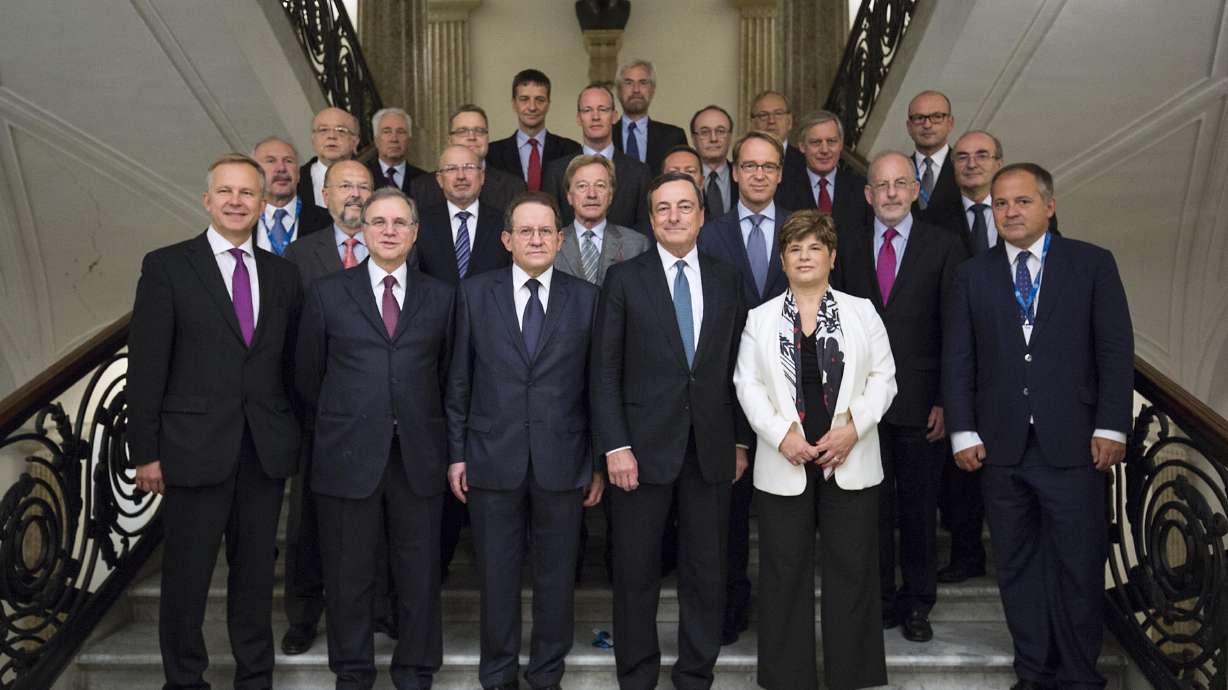Estimated read time: 4-5 minutes
This archived news story is available only for your personal, non-commercial use. Information in the story may be outdated or superseded by additional information. Reading or replaying the story in its archived form does not constitute a republication of the story.
NAPLES, Italy (AP) — European Central Bank head Mario Draghi underlined the bank's willingness to step up its economic stimulus efforts — but left open questions about the size of upcoming measures after the bank's meeting Thursday.
Markets fell after his statements, as some investors were hoping for a stronger commitment to more stimulus.
Germany's main index declined 2 percent, France's 2.8 percent and Italy's a whopping 3.9 percent. The euro rose to $1.2654 from $1.2630 earlier in the day, a sign that currency traders were scaling back their expectations for future monetary stimulus.
Draghi warned that the economic recovery in the 18 euro countries "weak, fragile, and uneven" and held out the eventual prospect of doing large scale bond purchases, or quantitative easing, later on if the economy gets even worse.
Yet his remarks during a press conference mostly focused on stimulus programs the ECB has already unveiled in June and September and will carry out in coming months. They include ultra-cheap loans to banks and purchases of bundles of bank loans.
Draghi declined to put a figure on the amount of stimulus the bank planned to add through the bundled-loan purchases. And he left the impression that even bigger efforts, such as wide-ranging purchases of government bonds, or quantitative easing, weren't imminent.
On Thursday, the ECB kept its benchmark rate unchanged at 0.05 percent. It could scarcely do anything else; the rate is almost zero and Draghi has conceded rates are as low as they can go. That is why attention has turned to unconventional steps such as a program announced in September to buy bonds made of bundles of bank loans. The purchases, which will start this month and last two years, are meant to encourage banks to lend more.
The ECB's recent attempts to support the economy put it on a different path from the U.S. Federal Reserve, which is considering when to start raising rates as the U.S. economy grows more strongly. The divergence has had strong consequences for the euro's exchange rate against the dollar.
Because stimulus efforts dilute the value of a currency, the euro has fallen sharply in recent months, from $1.39 in early May. So far, that has been one of the most significant effects of the ECB's record low interest rates and loose monetary policy. The lower euro will help raise inflation, currently at an alarmingly low level of 0.3 percent. And it helps exporters by making their goods cheaper in foreign markets.
Draghi said the purchases of bundled bank loans would have a "sizeable impact on our balance sheet," which measures how much the ECB is doing to support the economy. Draghi has said he wants to push the balance sheet toward levels it had in 2012, which would imply up to 1 trillion euros ($1.26 trillion) in new stimulus.
But he declined Thursday to put a precise number on what the bank hopes to achieve.
"That may come as a disappointment to some observers," said analyst Christian Schulz at Berenberg bank.
Draghi's comments also did not suggest that a bigger stimulus program like QE was on the way soon.
He said recent data confirms the weakening of growth in the eurozone. The currency bloc did not grow at all in the second quarter and economists have been trimming future estimates. "Our recovery is weak, fragile, and uneven, and still is," he said.
Yet he noted that the ECB had unveiled "a massive amount of measures" this summer and indicated it now wants to see how well they work. "We haven't seen yet their impact on the economy," he said.
Investors seemed to take that as an indication that larger stimulus like QE would have to wait for now.
"We did not get the impression that the ECB is inching toward a broad based QE program," analysts at investment bank Morgan Stanley wrote in a note to clients.
On top of the program to buy bundles of bank loans, the ECB has since June cut its bench mark refinancing rate to a record low and offered cheap, long-term loans to banks on condition they lend more to companies.
All the measures are aimed at making credit cheaper and more abundant for companies, in hopes they will borrow, expand and hire.
As the ECB's policymakers held their meeting in Naples, street protests outside the building turned violent. Riot police used water cannons to break up more than 3,000 demonstrators carrying banners against government austerity policies and unemployment. It was one of two meetings the ECB holds every year away from its Frankfurt headquarters to stress its multinational role as the monetary authority for the European Union member countries that use the euro.
Asked about the protests, Draghi was at pains to stress that the bank has already taken action to improve growth and employment. He said the bank had cut rates as far as they can go. "I find this description of the ECB as the guilty actor needs to be corrected," Draghi said.
___
McHugh contributed from Frankfurt, Germany.
Copyright © The Associated Press. All rights reserved. This material may not be published, broadcast, rewritten or redistributed.








